Unit 2 What time do you go to schoo?Section B 2a-2c 课件(共38张PPT)
文档属性
| 名称 | Unit 2 What time do you go to schoo?Section B 2a-2c 课件(共38张PPT) |
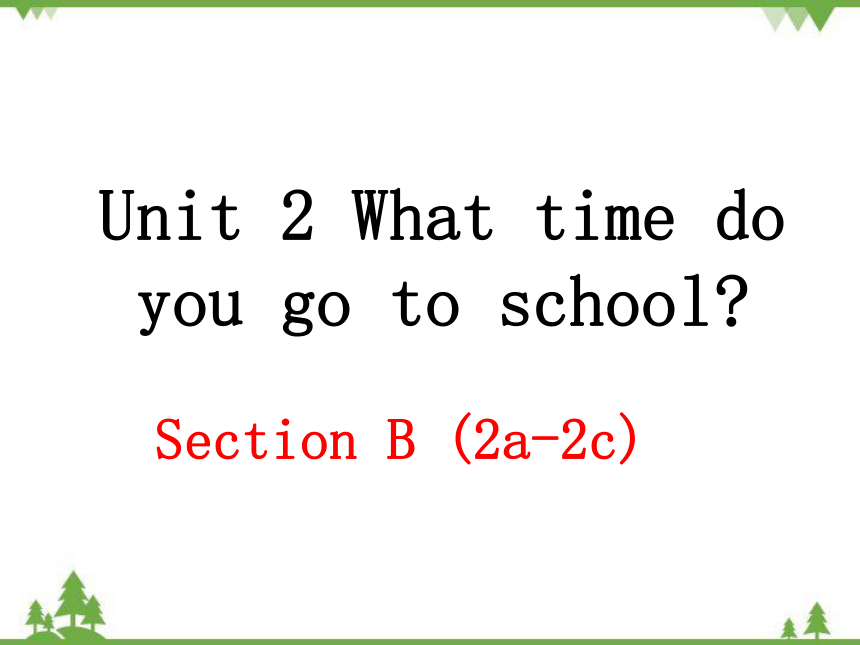
|
|
| 格式 | ppt | ||
| 文件大小 | 2.1MB | ||
| 资源类型 | 教案 | ||
| 版本资源 | 人教新目标(Go for it)版 | ||
| 科目 | 英语 | ||
| 更新时间 | 2022-05-24 00:00:00 | ||
图片预览

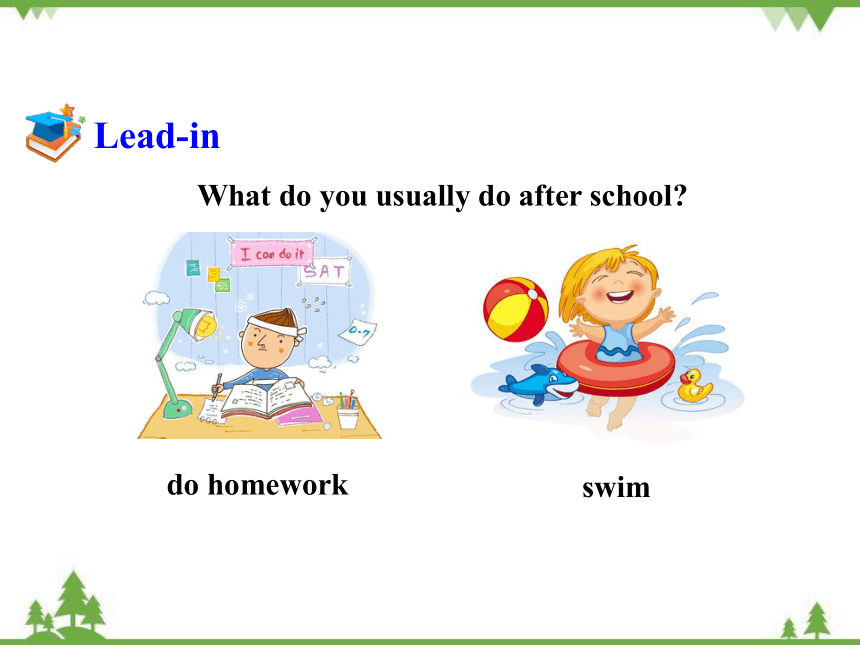
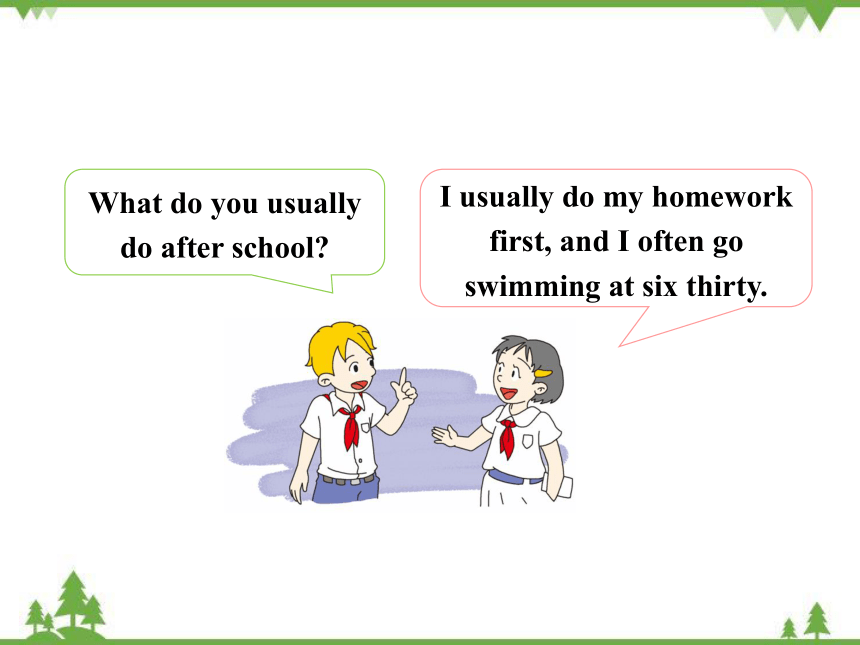
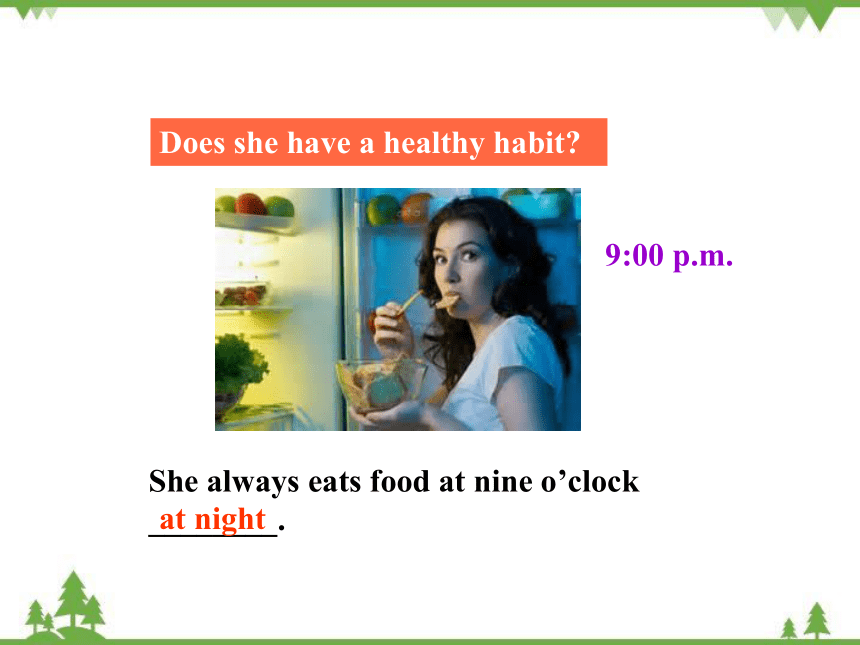
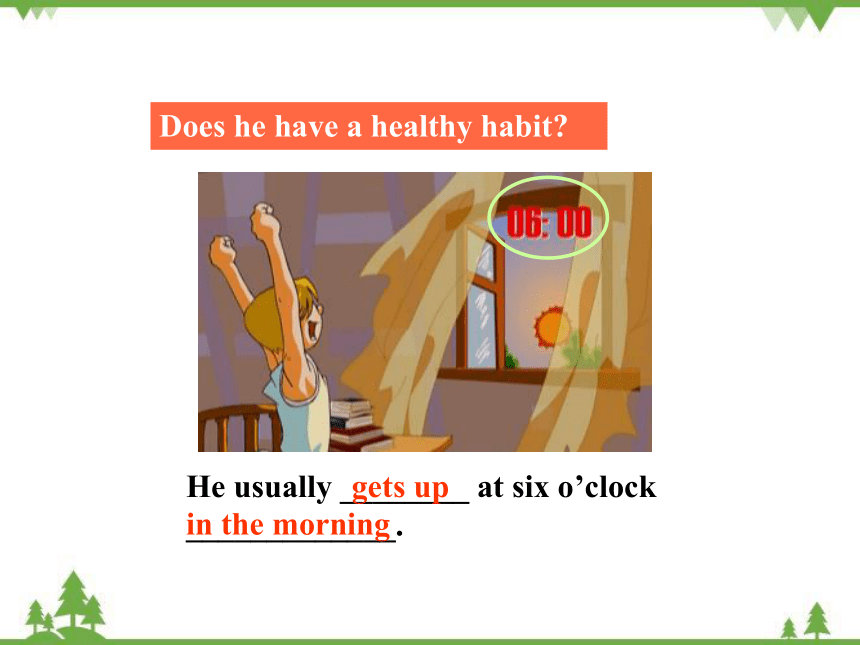
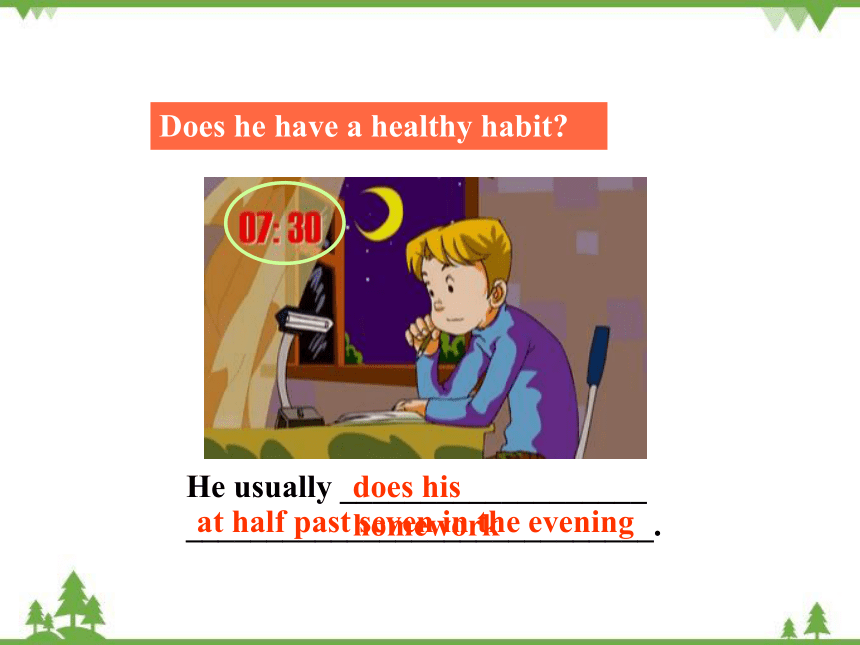
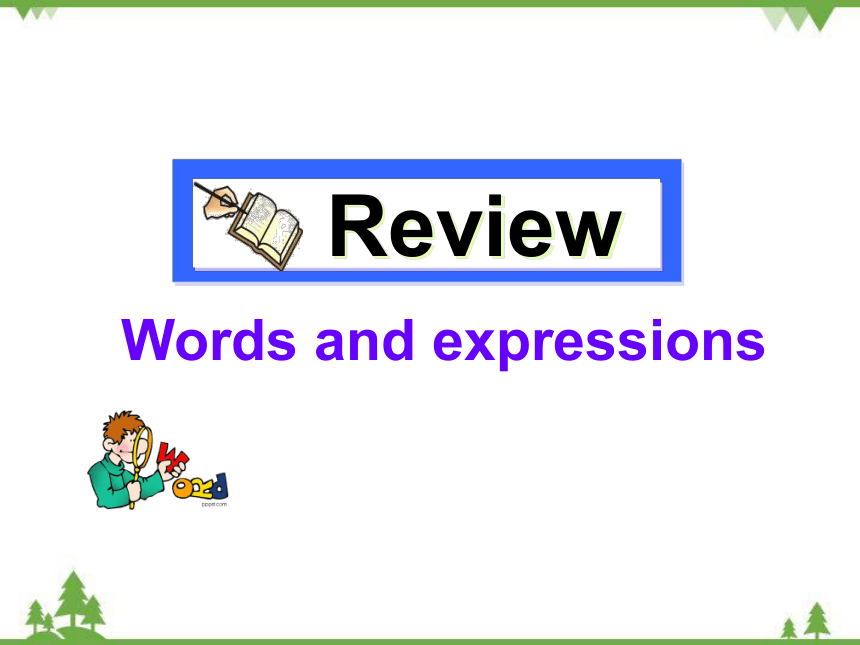
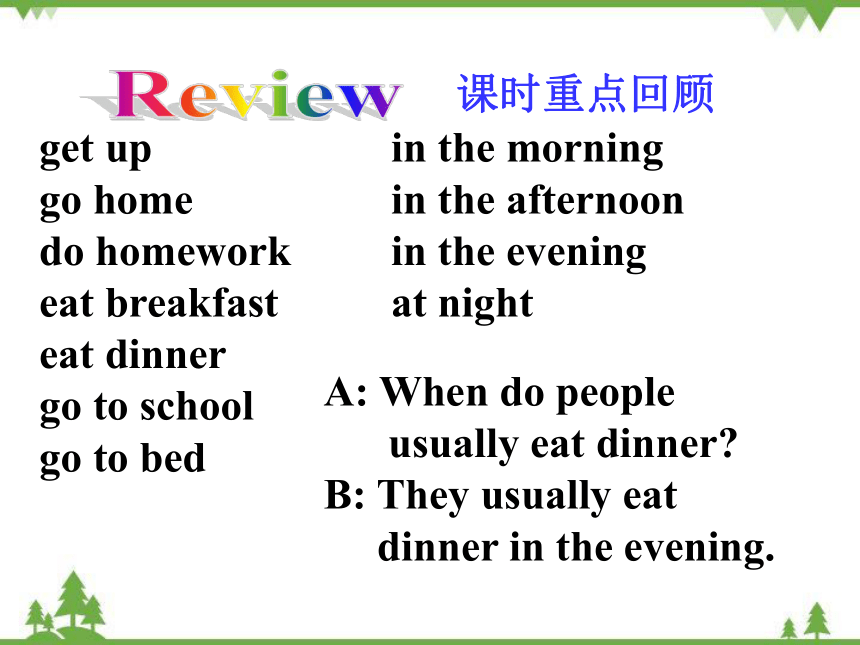
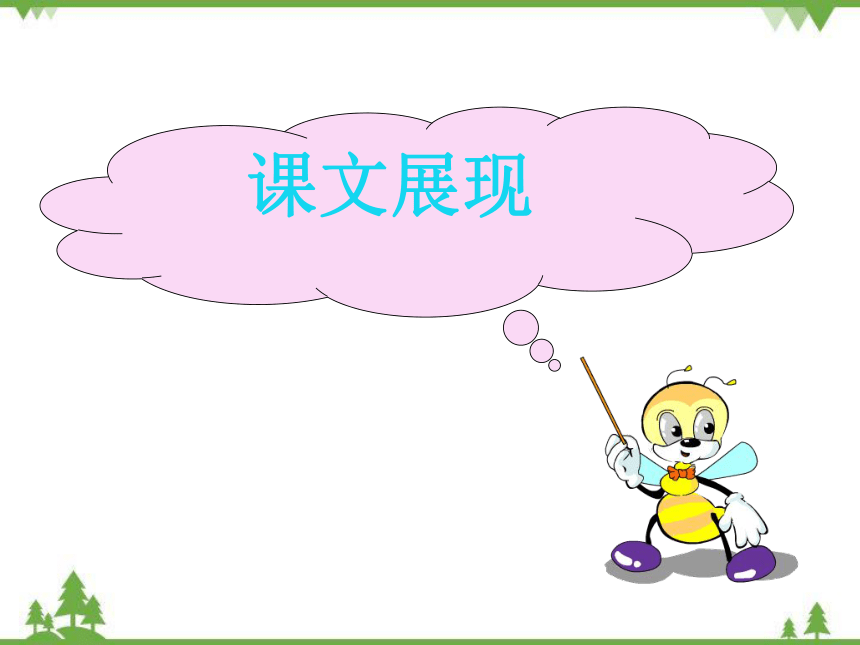
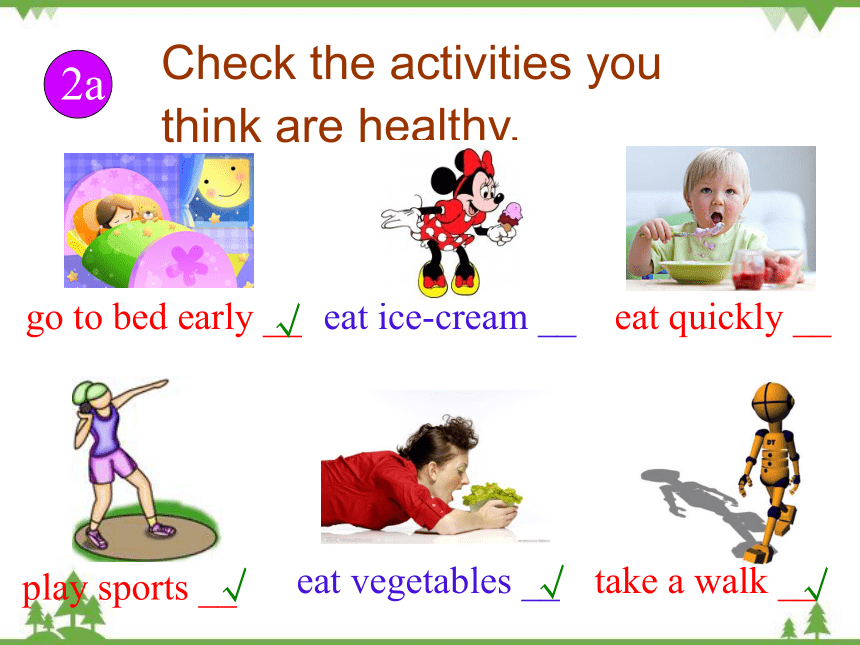
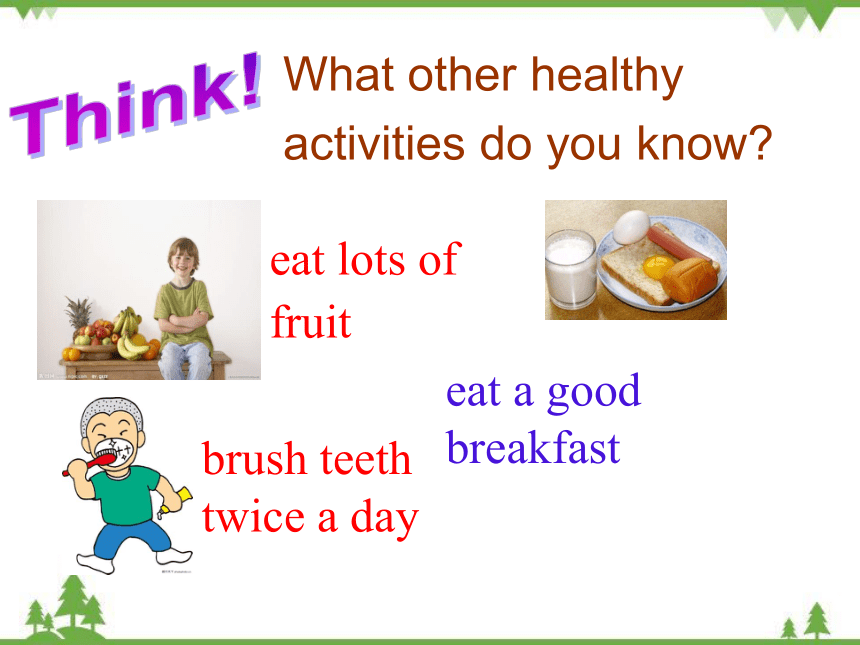
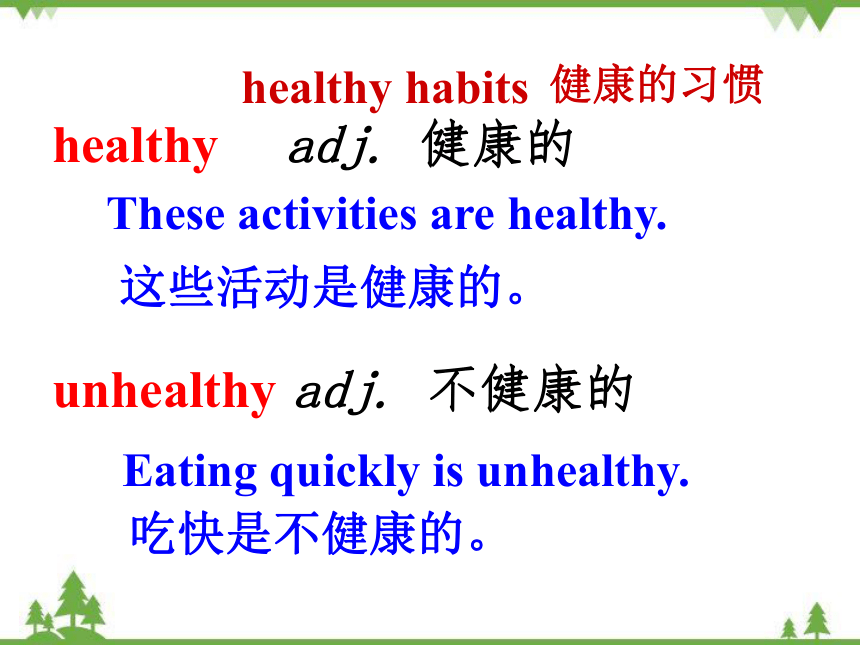
文档简介
(共39张PPT)
Section B (2a-2c)
Unit 2 What time do you go to school
Lead-in
What do you usually do after school
do homework
swim
What do you usually do after school
I usually do my homework
first, and I often go swimming at six thirty.
She always eats food at nine o’clock ________.
9:00 p.m.
at night
Does she have a healthy habit
He usually ________ at six o’clock _____________.
gets up
Does he have a healthy habit
in the morning
He usually ___________________ _____________________________.
does his homework
Does he have a healthy habit
at half past seven in the evening
Review
Words and expressions
课时重点回顾
get up
go home
do homework
eat breakfast
eat dinner
go to school
go to bed
in the morning
in the afternoon
in the evening
at night
A: When do people
usually eat dinner
B: They usually eat
dinner in the evening.
课文展现
go to bed early __
eat ice-cream __
play sports __
eat quickly __
take a walk __
eat vegetables __
Check the activities you
think are healthy.
√
√
√
√
2a
brush teeth twice a day
eat lots of fruit
What other healthy
activities do you know
eat a good breakfast
healthy
unhealthy
adj. 健康的
adj. 不健康的
These activities are healthy.
这些活动是健康的。
Eating quickly is unhealthy.
吃快是不健康的。
healthy habits
健康的习惯
Tony and Mary are brother and sister. They have healthy and unhealthy habits. Who is healthier Circle the healthy activities.
2b
Hi! I’m Tony. I don’t like to get up early. In the morning, I get up at eight. Then I go to school at eight thirty. I don’t have much time
for breakfast, so I usually eat very quickly. For
lunch, I usually eat hamburgers. After school, I sometimes play basketball for half an hour. When I get home, I always do my homework first. In the evening,I either watch TV or play computer games. At ten thirty, I brush my teeth and then I go to bed.
(时间)计,达
在……之后
Mary is my sister. She usually gets up at six thirty. Then she always takes a shower and eats a good breakfast. After that, she goes to school at eight thirty. At twelve, she eats lots of fruit and vegetables for lunch. After lunch, she sometimes plays volleyball.
fruit:水果(名词), 指水果总称或同种类水果时不加-s,指不同种类水果时要加-s。
She always eats ice-cream after dinner. She knows it’s not good for her, but it tastes good! In the evening, she does her homework and usually swims or takes a walk. At nine thirty, she goes to bed.
be good for
对……有益;对……有好处
Read the passage, and answer the questions.
2b
1.Who is healthier, Tony or Mary
2.When does Tony go to bed
3. When does Mary go to bed
4.What’s the relationship between Mary and Tony
Mary.
At ten thirty.
At nine thirty.
Mary is Tony’s sister.
Read 2b again and fill in the blanks.
Time Tony’s Activities
At eight __________
eats a quick breakfast
At eight thirty ________________
At noon ________________
After school ________________________________
__________________
in the evening
At ten thirty ______________________________
brushes teeth and goes to bed
gets up
goes to school
eats hamburgers
plays basketball for half an hour
does his homework
watches TV or plays computer games
Time Mary’s Activities
____________ gets up
takes a shower and eats a good breakfast
____________ goes to school
At twelve ____________________________
After lunch ______________
______________
in the evening
At nine thirty _________________________________________
goes to bed
At six thirty
At eight thirty
eat lots of fruit and vegetables
plays volleyball
eats ice-cream
does her homework, swims or takes a walk
2c
Write down the unhealthy habits of each person. Then think of healthy activities for them.
Unhealthy habits Healthy activities
Tony
Mary
have breakfast
quickly
have breakfast slowly
eat ice-cream after dinner
usually eat hamburgers
get up late
get up early
eat fruit and vegetables
Don’t eat ice-cream after dinner
1. past prep. 晚于;过(时间)
adj. 过去的
e.g. It’s half _____ ten. (过)
The danger was ______. (过去)
2. homework n. 家庭作业
e.g. Do you have _______ homework
today (much, many)
past
past
much
3. run v. 跑;奔
e.g. My sister likes _______ in the morning.
(跑步)
拓展: runner n. 参加跑步的选手
4. walk n. & v. 行走;步行
e.g. Our headteacher always ______ to
school every morning.
拓展: take a walk go for a walk
e.g. I want ____________ with you. (散步)
Let’s _____________. (去散步)
running
walks
to take a walk
go for a walk
5. clean v. 打扫;弄干净 adj. 干净的
e.g. Does he often ______ his mother’s
room
We must keep our environment ______.
拓展: cleaner n. 清洁工
do some/the cleaning
clean
clean
quickly adv. “很快地”,修饰动词。
e.g. Don’t eat quickly. It’s not a good habit. 别吃得太快,这不是个好习惯。
拓展:quick adj. 快的;迅速的
e.g. Tom eats a quick breakfast, then
goes to school.
汤姆快速吃完早饭,然后就去上学
了。
6. …so I usually eat very quickly.
7. In the evening, I either watch TV or play computer games.
either conj. 或者 adv. 也(用在否定词组后)
either… or… “或者……或者……;要么…….要么……; 不是……就是…… ” 连接两个独立的词、短语或句子成份。
当either…or…连接两个名词作主语时,谓语动词的时态和数应与最近的一个相匹配(就近一致) 。
e.g. Either you or he ___ right.
He is good at ________ singing
________ dancing.(要么...要么)
You needn’t go to the shop
________. (也)
is
either
or
either
8. …she eats lots of fruit and vegetables for lunch.
lots of与many, much的用法
都有“许多;大量”之意,但用法不同。
1) lots of后面可以跟可数名词也可以跟不可数名词。
e.g. He doesn’t have lots of (=many)
books.
We have lots of (=much) work to do.
2) many与可数名词复数形式连用。
e.g. There are many apples in the basket.
篮子里有许多苹果。
3) much表数量时,只能修饰不可数名词。
e.g. We don’t have much milk.
我没有很多牛奶了。
9. She knows it’s not good for her, but it tastes good!
1) be good for …表示“对……有益;对……有好处”;
be bad for…表示“对……有害;对……有坏处”。
e.g.
It’s good for our health to go to bed early
and get up early.
早睡早起对我们的健康有好处。
Don’t read in the dark. It’s bad for your
eyes.
不要在暗处看书,这对你的眼睛有害。
翻译下列句子。
Apples taste good.
____________________
Does the ice-cream taste nice
__________________________
The ice-cream has a taste of lemon.
__________________________
2) taste意为“品尝 …… 的味道”。是连系动词,后面常跟形容词。
拓展:taste n. “味道”
苹果尝起来味道很好。
冰淇淋的味道尝起来很好吗?
冰淇淋有点柠檬的味道。
Exercise
一、单项选择。
1. Tony doesn't have healthy lifestyle, his brother doesn't
have a healthy lifestyle, _______.
A. too B. also C. either D. or
2. Doing exercise every day is good ______ your health.
A. for B. at C. with D. in
C
A
3. He usually goes to school by bus, but ______ he goes to school on foot because he thinks walking is good for him.
A. some time B. usually C. never D. sometimes
4. We stay at home _______ five days.
A.at? B.in C. for D. with
D
C
5. —How do you like the two pairs of shorts
—They don’t fit me well. They are _____ too long
_____ too short.
A. not only; but also B. both; and
C. neither; nor D. either; or
6. There are _____cups on the table and there is _____
fruit juice in the cups.
A. lots of;many B. lots of;much
C. many;many D. much;lots of
D
B
二、根据提示完成句子。
1. I do _____ _____ (许多) homework every day.
2. The food ______ (尝起来) delicious.
3. He doesn't like getting up early, ______ (也).
4. Either you or he _____ (be) wrong.
5. Healthy food is _____ _____ (对...... 有好处) us.
lots of
tastes
either
is
good for
Summary
Key words & phrases:
quickly, either, lot, sometimes, taste,
life, either…or…, lots of
Key sentences:
1. I always get up at six.
2. I sometimes play basketball for half an hour.
3. In the evening, I either watch TV or play computer games.
4. I have a very healthy life.
Homework:
2. Retell the passage of 2b.
1. Review the new words and phrases.
Section B (2a-2c)
Unit 2 What time do you go to school
Lead-in
What do you usually do after school
do homework
swim
What do you usually do after school
I usually do my homework
first, and I often go swimming at six thirty.
She always eats food at nine o’clock ________.
9:00 p.m.
at night
Does she have a healthy habit
He usually ________ at six o’clock _____________.
gets up
Does he have a healthy habit
in the morning
He usually ___________________ _____________________________.
does his homework
Does he have a healthy habit
at half past seven in the evening
Review
Words and expressions
课时重点回顾
get up
go home
do homework
eat breakfast
eat dinner
go to school
go to bed
in the morning
in the afternoon
in the evening
at night
A: When do people
usually eat dinner
B: They usually eat
dinner in the evening.
课文展现
go to bed early __
eat ice-cream __
play sports __
eat quickly __
take a walk __
eat vegetables __
Check the activities you
think are healthy.
√
√
√
√
2a
brush teeth twice a day
eat lots of fruit
What other healthy
activities do you know
eat a good breakfast
healthy
unhealthy
adj. 健康的
adj. 不健康的
These activities are healthy.
这些活动是健康的。
Eating quickly is unhealthy.
吃快是不健康的。
healthy habits
健康的习惯
Tony and Mary are brother and sister. They have healthy and unhealthy habits. Who is healthier Circle the healthy activities.
2b
Hi! I’m Tony. I don’t like to get up early. In the morning, I get up at eight. Then I go to school at eight thirty. I don’t have much time
for breakfast, so I usually eat very quickly. For
lunch, I usually eat hamburgers. After school, I sometimes play basketball for half an hour. When I get home, I always do my homework first. In the evening,I either watch TV or play computer games. At ten thirty, I brush my teeth and then I go to bed.
(时间)计,达
在……之后
Mary is my sister. She usually gets up at six thirty. Then she always takes a shower and eats a good breakfast. After that, she goes to school at eight thirty. At twelve, she eats lots of fruit and vegetables for lunch. After lunch, she sometimes plays volleyball.
fruit:水果(名词), 指水果总称或同种类水果时不加-s,指不同种类水果时要加-s。
She always eats ice-cream after dinner. She knows it’s not good for her, but it tastes good! In the evening, she does her homework and usually swims or takes a walk. At nine thirty, she goes to bed.
be good for
对……有益;对……有好处
Read the passage, and answer the questions.
2b
1.Who is healthier, Tony or Mary
2.When does Tony go to bed
3. When does Mary go to bed
4.What’s the relationship between Mary and Tony
Mary.
At ten thirty.
At nine thirty.
Mary is Tony’s sister.
Read 2b again and fill in the blanks.
Time Tony’s Activities
At eight __________
eats a quick breakfast
At eight thirty ________________
At noon ________________
After school ________________________________
__________________
in the evening
At ten thirty ______________________________
brushes teeth and goes to bed
gets up
goes to school
eats hamburgers
plays basketball for half an hour
does his homework
watches TV or plays computer games
Time Mary’s Activities
____________ gets up
takes a shower and eats a good breakfast
____________ goes to school
At twelve ____________________________
After lunch ______________
______________
in the evening
At nine thirty _________________________________________
goes to bed
At six thirty
At eight thirty
eat lots of fruit and vegetables
plays volleyball
eats ice-cream
does her homework, swims or takes a walk
2c
Write down the unhealthy habits of each person. Then think of healthy activities for them.
Unhealthy habits Healthy activities
Tony
Mary
have breakfast
quickly
have breakfast slowly
eat ice-cream after dinner
usually eat hamburgers
get up late
get up early
eat fruit and vegetables
Don’t eat ice-cream after dinner
1. past prep. 晚于;过(时间)
adj. 过去的
e.g. It’s half _____ ten. (过)
The danger was ______. (过去)
2. homework n. 家庭作业
e.g. Do you have _______ homework
today (much, many)
past
past
much
3. run v. 跑;奔
e.g. My sister likes _______ in the morning.
(跑步)
拓展: runner n. 参加跑步的选手
4. walk n. & v. 行走;步行
e.g. Our headteacher always ______ to
school every morning.
拓展: take a walk go for a walk
e.g. I want ____________ with you. (散步)
Let’s _____________. (去散步)
running
walks
to take a walk
go for a walk
5. clean v. 打扫;弄干净 adj. 干净的
e.g. Does he often ______ his mother’s
room
We must keep our environment ______.
拓展: cleaner n. 清洁工
do some/the cleaning
clean
clean
quickly adv. “很快地”,修饰动词。
e.g. Don’t eat quickly. It’s not a good habit. 别吃得太快,这不是个好习惯。
拓展:quick adj. 快的;迅速的
e.g. Tom eats a quick breakfast, then
goes to school.
汤姆快速吃完早饭,然后就去上学
了。
6. …so I usually eat very quickly.
7. In the evening, I either watch TV or play computer games.
either conj. 或者 adv. 也(用在否定词组后)
either… or… “或者……或者……;要么…….要么……; 不是……就是…… ” 连接两个独立的词、短语或句子成份。
当either…or…连接两个名词作主语时,谓语动词的时态和数应与最近的一个相匹配(就近一致) 。
e.g. Either you or he ___ right.
He is good at ________ singing
________ dancing.(要么...要么)
You needn’t go to the shop
________. (也)
is
either
or
either
8. …she eats lots of fruit and vegetables for lunch.
lots of与many, much的用法
都有“许多;大量”之意,但用法不同。
1) lots of后面可以跟可数名词也可以跟不可数名词。
e.g. He doesn’t have lots of (=many)
books.
We have lots of (=much) work to do.
2) many与可数名词复数形式连用。
e.g. There are many apples in the basket.
篮子里有许多苹果。
3) much表数量时,只能修饰不可数名词。
e.g. We don’t have much milk.
我没有很多牛奶了。
9. She knows it’s not good for her, but it tastes good!
1) be good for …表示“对……有益;对……有好处”;
be bad for…表示“对……有害;对……有坏处”。
e.g.
It’s good for our health to go to bed early
and get up early.
早睡早起对我们的健康有好处。
Don’t read in the dark. It’s bad for your
eyes.
不要在暗处看书,这对你的眼睛有害。
翻译下列句子。
Apples taste good.
____________________
Does the ice-cream taste nice
__________________________
The ice-cream has a taste of lemon.
__________________________
2) taste意为“品尝 …… 的味道”。是连系动词,后面常跟形容词。
拓展:taste n. “味道”
苹果尝起来味道很好。
冰淇淋的味道尝起来很好吗?
冰淇淋有点柠檬的味道。
Exercise
一、单项选择。
1. Tony doesn't have healthy lifestyle, his brother doesn't
have a healthy lifestyle, _______.
A. too B. also C. either D. or
2. Doing exercise every day is good ______ your health.
A. for B. at C. with D. in
C
A
3. He usually goes to school by bus, but ______ he goes to school on foot because he thinks walking is good for him.
A. some time B. usually C. never D. sometimes
4. We stay at home _______ five days.
A.at? B.in C. for D. with
D
C
5. —How do you like the two pairs of shorts
—They don’t fit me well. They are _____ too long
_____ too short.
A. not only; but also B. both; and
C. neither; nor D. either; or
6. There are _____cups on the table and there is _____
fruit juice in the cups.
A. lots of;many B. lots of;much
C. many;many D. much;lots of
D
B
二、根据提示完成句子。
1. I do _____ _____ (许多) homework every day.
2. The food ______ (尝起来) delicious.
3. He doesn't like getting up early, ______ (也).
4. Either you or he _____ (be) wrong.
5. Healthy food is _____ _____ (对...... 有好处) us.
lots of
tastes
either
is
good for
Summary
Key words & phrases:
quickly, either, lot, sometimes, taste,
life, either…or…, lots of
Key sentences:
1. I always get up at six.
2. I sometimes play basketball for half an hour.
3. In the evening, I either watch TV or play computer games.
4. I have a very healthy life.
Homework:
2. Retell the passage of 2b.
1. Review the new words and phrases.
同课章节目录
- Unit 1 Can you play the guitar?
- Section A
- Section B
- Unit 2 What time do you go to school?
- Section A
- Section B
- Unit 3 How do you get to school?
- Section A
- Section B
- Unit 4 Don't eat in class.
- Section A
- Section B
- Unit 5 Why do you like pandas?
- Section A
- Section B
- Unit 6 I'm watching TV.
- Section A
- Section B
- Review of Units 1-6
- Unit 7 It's raining!
- Section A
- Section B
- Unit 8 Is there a post office near here?
- Section A
- Section B
- Unit 9 What does he look like?
- Section A
- Section B
- Unit 10 I'd like some noodles.
- Section A
- Section B
- Unit 11 How was your school trip?
- Section A
- Section B
- Unit 12 What did you do last weekend?
- Section A
- Section B
